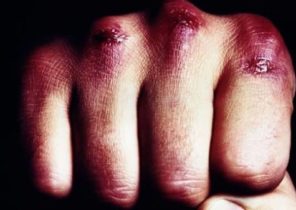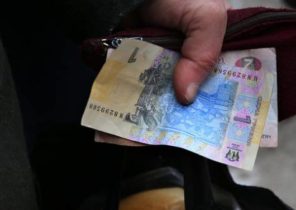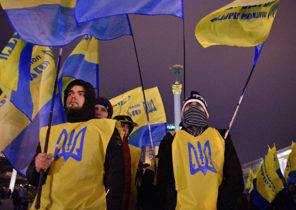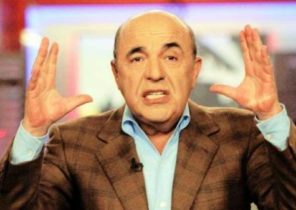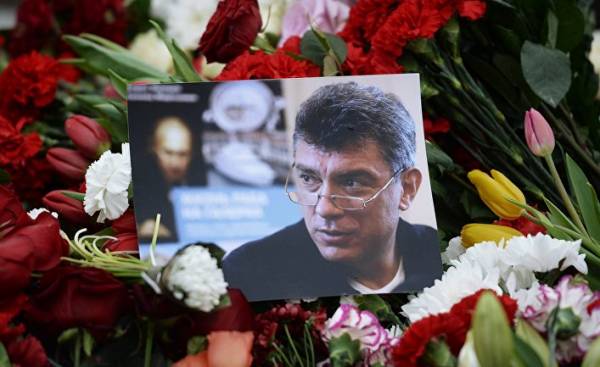
In February in Moscow, St. Petersburg and other cities across Russia held demonstrations and rallies marking the second anniversary of the murder of Boris Nemtsov, former Deputy Prime Minister and leader of the Russian Pro-democracy opposition, who was shot dead near the Kremlin walls on February 27, 2015. Although the suspects in the killings — all of them are somehow connected with the Governor of Vladimir Putin in Chechnya, Ramzan Kadyrov — are currently under court investigation failed to find those who ordered and organized the murder.
The impression that the Russian government is struggling to erase the memory of Nemtsov. Several times a week workers of municipal services together with the police to remove the memorial, spontaneously arisen on the bridge at the spot where Nemtsov was killed, and the city authorities have repeatedly rejected the petitions of activists that insist on placing a memorial plaque in Moscow. Although the memory of the Germans continues to live in the Russian society, the authorities recognize his achievements only when in Russia will change the mode.
Meanwhile, this does not apply to other countries.
This year February 27, Senator Marco Rubio (Marco Rubio) proposed to the bill, according to which the area in front of the Russian Embassy in Washington should be renamed in “Boris Nemtsov Plaza”, causing the address of the Embassy will sound like Boris Nemtsov Plaza, house 1. This bill was supported by senators Ron Johnson (Ron Johnson) and John McCain (John McCain), after which he was sent for consideration to the Committee on homeland security and governmental Affairs, chaired by Johnson.
“If you will, “Boris Nemtsov Plaza”, it will be for the Putin regime and the Russian people a constant reminder that the ideas of these dissidents continue to live, and that defenders of freedom cannot be silenced, — said Rubio in a statement. Are these signs on the street or thousands of letters addressed to the Embassy at Boris Nemtsov Plaza, building 1, the Kremlin will be clear that the intimidation and murder of opposition figures will not go unnoticed”.
Rename this specific place in Washington will have not only symbolic value. September 28, 1994, the Germans took part in the official opening ceremony of the Russian Embassy in Washington. Nemtsov, who was then Governor of Nizhny Novgorod region, became part of the delegation headed by President Boris Yeltsin. At dinner at the Embassy that evening Yeltsin, Nemtsov has presented to President bill Clinton, hinting at how he sees the future of the young politician.
Strobe Talbott (Strobe Talbott), who then held the post of Deputy Secretary of state, stood talking presidents. During our recent meeting Talbott remembered that Yeltsin told Clinton about the Germans: “Let me introduce you to this young man. Take a look at it. This young man is as good as I am, as strong as I am, and he will be President of Russia.”
The Germans did not become President. But for many of my compatriots he became a symbol of a different Russia — a more democratic, more prosperous, more European — Russia at peace with itself and its neighbors.
The renaming of the addresses of the diplomatic missions is already a precedent, which was also initiated by Congress and was also associated with Russia. In 1984 the adoption of the amendments proposed by Senator Alphonse D’amato (Alfonse M. D’amato), we have changed the address of the Soviet Embassy on 16th street on the “Andrei Sakharov Plaza, building 1” — in honor of the Russian dissident and Nobel peace prize laureate, who at that time was in exile in Gorky. Few people could then imagine that in less than 10 years a bust of Sakharov will stand inside the Embassy.
The time will come when Russia will be proud of the fact that the form of its Embassy in Washington is the name of Boris Nemtsov. And Russia will be very grateful to those who in difficult times has not allowed her to forget about him.
Vladimir Kara-Murza as Vice-President of the movement “Open Russia” and the Chairman of Fund of Boris Nemtsov. At the moment he is being treated after a suspected poisoning, the result of which in February, he slipped into a coma.
